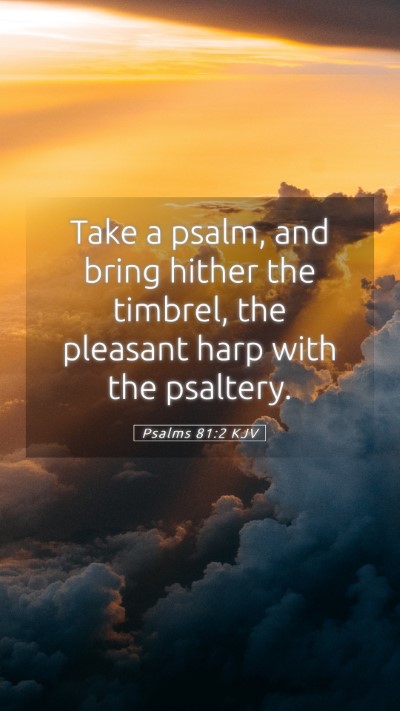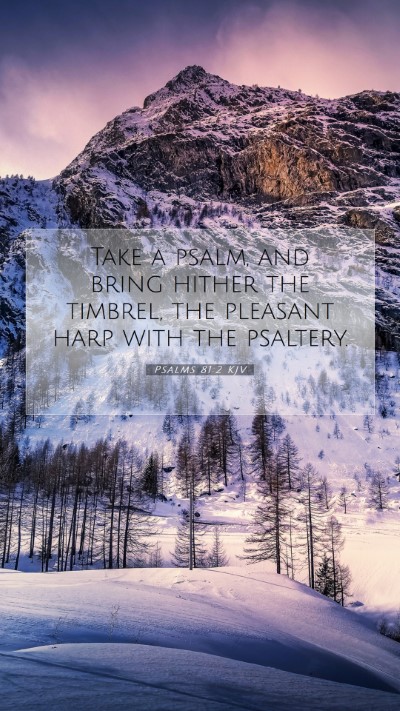Psalms 81:2 - Understanding the Verse
The instruction encapsulated in Psalms 81:2 is both profound and rich in meaning, offering valuable insights into worship and the call to a unified praise of God. This particular verse states:
"Take a psalm and bring hither the timbrel, the pleasant harp with the psaltery."
Context and Significance
Psalms 81 is a call to Israel to celebrate and remember God's deliverance. It emphasizes the need for communal worship and the spiritual instruments that aid in this process. Let us delve into various commentaries that expound on this verse, offering deep meanings and interpretations.
Commentary Insights
-
Matthew Henry's Commentary:
Matthew Henry emphasizes the importance of worshiping God with joy and music. He interprets the call to bring musical instruments as not merely a recommendation but as a requirement for expressing gratitude and reverence to the Lord. Henry notes that music has a profound ability to stir the soul and engage the heart in the worship of God, reflecting the duty of believers to celebrate His wonders.
-
Albert Barnes' Notes:
Barnes highlights the symbolic nature of the instruments mentioned — the timbrel, harp, and psaltery. He suggests that these instruments represent various aspects of worship, from joy (timbrel) to meditation (harp) and song (psaltery). He explains that God desires a heartfelt offering through worship, which is not limited to lyrics alone but extends to the celebratory sounds of instruments that uplift the congregation in praise.
-
Adam Clarke's Commentary:
Adam Clarke elaborates on the historical context of this verse, indicating that during this time, music was an essential part of Jewish worship. He encourages readers to understand that this verse is not merely about the activity of music but the spirit in which it is performed — an invitation to bring forth one's best in worship to honor God. Clarke insists on the transformative power of music in collective worship as a unifying element among believers.
Key Themes
The verse's themes extend beyond the mere act of playing instruments; they touch on broader concepts relevant to Bible verse commentary, study, and application. Key themes include:
- Worship: The Scripture emphasizes the necessity of worship as a communal act, lifting praises to God.
- Joyful Expression: Instruments serve not just as tools of music but as expressions of joy and gratitude towards God.
- Unity in Praise: The call for congregational participation underlines the importance of unity among believers in worshiping God collectively.
Applying the Insights
This verse can be applied to modern worship settings where music and instruments play a significant role in church services. In understanding this verse, individuals and Bible study groups can reflect on:
- How they incorporate music into their worship practices.
- The significance of engaging the congregation through music and song.
- The historical roots of worship that can enrich current practices.
Bible Study Insights
The insights from this verse exemplify the importance of scripture analysis and biblical exegesis. For those engaging in online Bible study or in-person Bible study groups, Psalms 81:2 represents an opportunity to explore:
- The role of music in biblical worship.
- The scriptures' encouragement for involvement and participation during worship.
- Historical context and prophetic significance in relation to Israel and its practices.
Related Scriptures
Several other Bible verses resonate with the themes present in Psalms 81:2. These cross-references can provide further context and deepen understanding:
- Psalms 150:3-5: “Praise him with the sound of the trumpet: praise him with the psaltery and harp…”
- Colossians 3:16: “Let the word of Christ dwell in you richly; teaching and admonishing one another in psalms and hymns and spiritual songs…”
- 1 Chronicles 15:16: “And David spoke to the chief of the Levites to appoint their brethren to be the singers with instruments of music…”
Conclusion
The interpretation of Psalms 81:2 serves as a reminder of the significance of worship in the life of a believer. It invites both individual reflection and communal engagement in praising God through music, illustrating how the Old Testament continually informs current practices of worship. By exploring Bible verse meanings, interpretations, and applications, believers can deepen their understanding of scripture and enrich their spiritual journeys.


